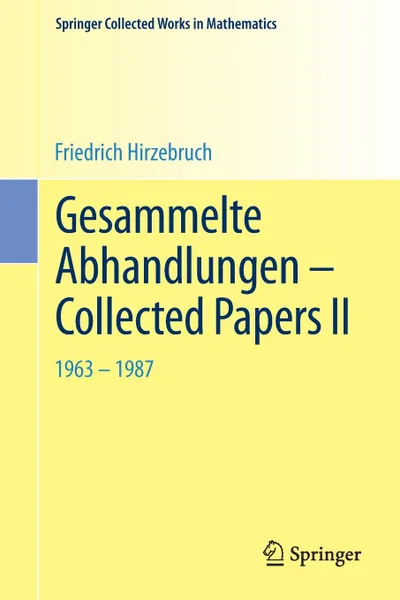Gesammelte Abhandlungen - Collected Papers II. 1963 - 1987 12+
Автор: Friedrich Hirzebruch
826 страниц
Категория: Литература на иностранных языках
ISBN: 9783642419553
Язык: Немецкий
Где найти книгу?
📕 Friedrich Hirzebruch (1927 -2012) was a German mathematician, working in the fields of topology, complex manifolds and algebraic geometry, and a leading figure of his generation. Hirzebruch's first great
mathematical achievement was the proof, in 1954, of the generalization of the classical Riemann-Roch theorem to higher dimensional complex manifolds, now known as the Hirzebruch-Riemann-Roch theorem. This used the new
techniques of sheaf cohomology and was one of the centerpieces of the explosion of new results in geometry and topology during the 1950s. Further generalization of this led to the Grothendieck-Riemann-Roch theorem, and the
Atiyah-Singer index theorem. He received many awards and honors, including the Wolf prize in 1988, the Lobachevsky prize in 1990, and fifteen honorary doctorates. These two volumes collect the majority of his research papers,
which cover a variety of topics. In zwei Bänden sind fast alle Veröffentlichungen enthalten, die F. Hirzebruch verfasst hat.
mathematical achievement was the proof, in 1954, of the generalization of the classical Riemann-Roch theorem to higher dimensional complex manifolds, now known as the Hirzebruch-Riemann-Roch theorem. This used the new
techniques of sheaf cohomology and was one of the centerpieces of the explosion of new results in geometry and topology during the 1950s. Further generalization of this led to the Grothendieck-Riemann-Roch theorem, and the
Atiyah-Singer index theorem. He received many awards and honors, including the Wolf prize in 1988, the Lobachevsky prize in 1990, and fifteen honorary doctorates. These two volumes collect the majority of his research papers,
which cover a variety of topics. In zwei Bänden sind fast alle Veröffentlichungen enthalten, die F. Hirzebruch verfasst hat.
Мнения
